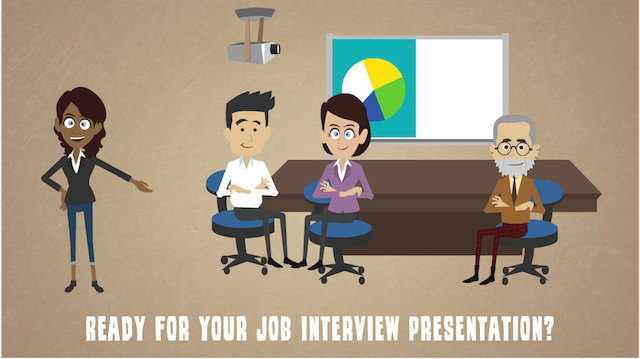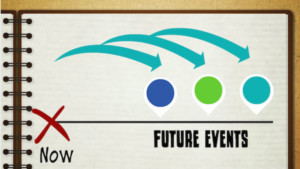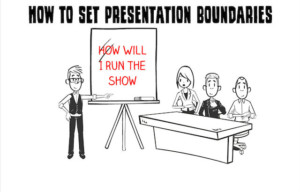What would you do if your next job required you to give a Job interview presentation?
Do you know how to prepare?
Do you know what to say?
Do you know what to talk about?
You have to start thinking and preparing for it before it happens. Because the higher your position in an organization, the more likely you will be asked to present during your interview.
Working with hundreds of professionals over the years ( Professionals from Rosetta Stone, Genentech, SalesForce.com, Coiler, City of San Francisco, Chronicle Books, etc.) to help them prepare for their job interview presentations, I came up with a list of 5 tips to help you do well and get the job.
1 – Focus
Don’t talk about everything; Talk about one thing (maybe two). It’s important to stay “on message” so that your audience does not get confused.
It’s very tempting to talk about everything you know because you want to show your skills and knowledge. I once worked with a senior scientist who interviewed for a job and in the first draft of her presentation; she had included a list of all the techniques she knew instead of keeping the relevant ones. That’s normal; I see it all the time with clients. However, once you finish the first draft, you want to become brutal with scraping to maintain a tight focus.
The main purpose of the presentation interview is to see how well you communicate your ideas. So pick something you can communicate well and stay on point.
Examples:
- Instead of talking about all your x-projects, talk about one of them.
- Instead of talking about 5 experiments, talk about one or two experiments to support one point.
- Instead of having multiple lessons, have “one” take-home message.
- Instead of having 10 ideas to flesh out, just have one.
2 – Set the context
Before you start talking about the details, make sure your audience knows the background of your topic. This is especially important if you speak on previous projects or technologies you worked on.
You are interviewing at a new company who might not know about your previous company or position. So it’s important to give them some background to set the stage.
One of my clients was interviewing with a medical device company and in her previous work experience was on a vaccine for Prostate Cancer. When speaking about her past job, if she had started talking about the complex technology she used for her previous work without giving context, most of the audience would have been lost.
Instead, she dedicated 2 minutes in her introduction to cover the background of Cancer Vaccine Technology (At a very high level). Also, during the presentation, she linked what she was talking about to medical devices.
Always give context even if you think it is evident.
Additional Example:
If you are going to talk about a software update for your previous employer, then make sure your audience knows why you were doing the update in the first place. Mention and explain the problem you were trying to solve and tell them why that was important.
Setting the context in the “introduction” of your talk is crucial. It is so important that we spend a big portion in the Magnetic Presentations Boot Camp showing participants how to do it the right way – this part could make or break your presentation.
3- Ideas for interview presentation topics:
Unless you are doing a sales presentation for a company like Salesforce.com (Which gives you a case study to use for your presentation), you are usually free to pick your topic.
Here are some ideas to help you select a topic:
- A previous project you worked on
- New technology in your field
- Technology that could be helpful in your field
- Industry trends (no more than 3)
- Explore a published paper (yours or someone else’s)
- New or old process you have worked on or helped improve
- New or old product you have worked on
- Portfolio of your work
- State of the economy/ industry/ technology etc
- Sales presentation example
The list above should give you some ideas of what you need to talk about.
4- Think outside the box for presentation topics
Most professionals will do a presentation on a project they have done with their previous employer. That’s OK.
However, if you want to stand out, it’s a good idea to think outside the box. A client of mine once did a presentation on “Three Industry Trends For Social Media Marketing,” as she interviewed for a senior marketing position.
That was outside the box (because her competition talked about a previous company project) My client ended up getting the job – She stood out as a competent leader of industry trends (She did a lot of research for the presentation and weaved in her personal experience as well).
5- Toot your own horn
No one likes a show-off, yet, you have to do it a little in a job interview presentation. You have to share what you did, and how you contributed. In most circumstances, that’s shied away from but in a job interview, it is required and expected.
A recent study conducted at the University of Nebraska – Lincoln demonstrated that people who “self-promote” at the job interview presentation were rated as more superior, more capable, and more hireable than those who did not self-promote.
Regardless of what you are presenting on, you are introducing yourself, so you need to toot your own horn throughout the presentation.
Ok now here are some things to avoid.
Things to avoid in an interview presentation
- Avoid critiquing the company you are interviewing for (unless they specifically request it).
- Avoid bad-mouthing previous employers.
- Avoid making recommendations for the company regarding their processes unless you are sure this is what they want.
- Avoid ending your presentation on a bad note.
- Avoid making the whole presenting about you. Tooting your horn is a good few times during the presentation but not all the way through.
- Avoid looking too prepared or not prepared: you should come across natural and authentic.
- Avoid overwhelming your audience with data dumps.
- Avoid rambling
Conclusion
These were just four tips. There are more of course, but using them will help you stand out from almost everyone who interviews for the same position.
I see that a lot of companies start to require presentation as part of the interview process, and the trend will keep rising – are you ready for it?







